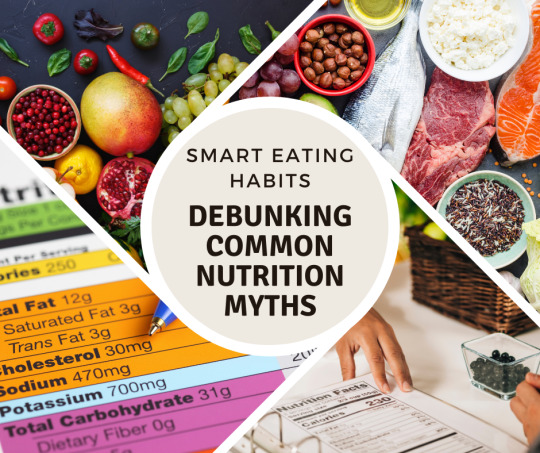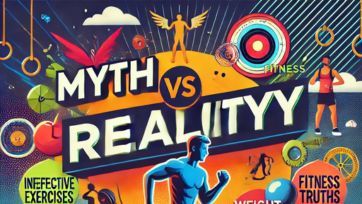#nutrition myths
Explore tagged Tumblr posts
Text
Debunking Popular Nutrition Myths: What Science Really Says
Uncover the truth behind common nutrition myths. Explore what science really says about carbs, fats, late-night eating, detox diets, and more
0 notes
Text
Egg Yolks SECRET Cholesterol Risks Revealed
The Hidden Cholesterol Risks of Egg Yolks: Separating Fact from Fiction Join me as I dive into the world of egg yolks and challenge myself to uncover the hidden cholesterol risks that might surprise you. Egg yolks have gotten a bad wrap over the years, and it’s time to set the record straight. Many of us have been led to believe that these golden centers are little cholesterol bombs waiting to…
#blood pressure#cholesterol#Cholesterol Risks#diet#Dietary Guidelines#Food Safety#food science#hdl#health tips#heart attack#heart disease#heart health#high blood pressure#high cholesterol#ldl#nutrition#Nutrition Myths#stroke#weight loss#wellness
0 notes
Text
Vegetable oils are a staple in kitchens around the world, used for cooking, baking, and as ingredients in countless food products. Despite their ubiquity, there are many myths and misconceptions surrounding vegetable oils.
#Vegetable Oils#Cooking Oils#Healthy Fats#Olive Oil#Canola Oil#Coconut Oil#Trans Fats#Saturated Fats#Unsaturated Fats#Omega-3#Omega-6#Smoke Point#Cold-Pressed Oils#Expeller-Pressed Oils#Heart Health#Balanced Diet#Nutrition Myths#Cooking Tips
0 notes
Text
0 notes
Photo

📚 Discover the truth about nutrition myths and elevate your eating habits! 💡🍎 Learn how to distinguish fact from fiction, and unlock the secrets to a healthier lifestyle. #NutritionMythsDebunked #SmartEatingHabits #ScienceBasedNutrition https://www.smarteatinghabits.com/smart-eating-habits-debunking-common-nutrition-myths/
0 notes
Text
The amount of misinformation surrounding nutrition is absolutely absurd. If you ask the average person who thinks they know a lot about nutrition, they'll likely have less than 0 understanding of how it works. If you ever have a question about nutrition or exercise, I genuinely cannot recommend Renaissance Periodization enough. The only way information gets put out is if a consideration of ALL the scientific literature is considered, and I have literally never seen them put out any bad info. I've seen Dr. Mike recommend people not buy his powerlifting training templates because he thought juggernaut.ai was better. I have never seen a more honest source of information coming out of the industry. Even people who are similarly respected end up plugging bullshit supplements or, at the very least, will NOT tell you if a competitor is a better source of information. If you ever, for any reason, find yourself thinking you know something about nutrition and that understanding guides how you eat or train, PLEASE look up an RP video on the topic. (they are also an extremely good source of info for bodybuilding and strength building (and yes, bodybuilders are very strong, and anyone who tells you they're show muscles and not practical muscles are 99/100 times weaker than even amateur bodybuilders))
#made this poast bc i have legit never seen a single post outside of very niche fitness circles on nutrition that has not contained a myth#certainly not on tumblr#that has been disproven already#saw like 5 today lol#also im sorry if this seems like I'm vauging a specific person I prommy I'm not I just saw an rp video on a topic that a lot of people have#wild misunderstandings about#(sugar)
161 notes
·
View notes
Text
seeing the shift of women's fitness culture go from weightlifting to being a "pilates princess"...burn it all
#tj talks#'lean muscle vs bulky muscle' oh go fuck yourself do you know how goddamn hard it is to get bulky?? to build heavy muscle??#it takes genuine years of dedicate work and nutrition to become 'bulky' but for some reason were still perpetuating the myth#that if a woman even LOOKS at a dumbell she turns into ronny coleman. stop this blasphemy#doing light weight training isnt going to make you bulky i promise.#also nothing wrong with pilates! i think its a good workout for core and rehabilitation for previously injured muscles!#but i think the mindset of associating it entirely with femininity and stregnthening the beleif that basic weight training is making women-#get bulky within two months is utter horseshit and just another way were see the fads surrounding womens body types shift#i could do a fucking essay on this shit#actually. i might
20 notes
·
View notes
Text
I had to relearn what I knew about protein, and through what I learned, I realized we don't actually need that much protein. There's this overemphasis on protein, particularly animal protein. And what I've learned now, at the end of the day, it's not how much protein you're consuming, but how much you're actually assimilating. Because when you're under this kind of protein spell, which was where I was, I forgot about everything else. I forgot about, you know, what about my antioxidants, what about my fiber? I just did not think of that. - Luke Tan in Let Us Be Heroes - The True Cost of Our Food Choices (2018)
#q#quotes#let us be heroes#the true cost of our food choices#true nourishment#protein myths#protein supplement#fitblr#wfpb#whole food plant based#nutrition#food centric herbalism#food industry#leveling up#holistic leveling up#rda#recommended daily allowance#food science#standard american diet#that girl#green juice girl#sidewalkchemistry
3 notes
·
View notes
Text
my dad thinks hes a health expert because he watches videos of doctors saying questionable shit on youtube. "cracking your joints too much means youre going to get arthritis" "intermittent fasting is good for you" "sugar is bad, salt is good, simple as that" and he says these things with such confidence as if he didnt just learn them 3 minutes ago from a highly unreliable source that he 100% did NOT fact-check
#the things he says about food and nutrition are especially insulting. he hardly ever cooks and when he does it's usually just meat+starch#if it's dad's turn to cook u know someone's gotta intervene and make sure there are vegetables other than pickles on the table#meanwhile my mother has been working her ass off to feed nutritious meals to her family for 26+ years#AND she grew up as a fat girl so she is well acquainted with fad diets & health food myths#dad does not have the CREDENTIALS
4 notes
·
View notes
Text

Welcome to PureAmerican Remedies – your trusted source for natural cures, holistic wellness, and DIY herbal remedies that work! Our faceless channel brings you scientifically backed, easy-to-follow videos on everything from time-tested Native American healing traditions to modern, all-natural solutions for everyday health challenges. Discover powerful insights on boosting immunity, managing stress naturally, and debunking common health myths – all tailored for the American lifestyle. With expert voiceovers, engaging animations, and step-by-step guides, we help you reclaim your well-being without the fluff. Join our community of health enthusiasts and start your journey to a naturally vibrant life today!
My Video Related To: – Natural cures, holistic wellness, herbal remedies – DIY herbal medicine, natural health tips – American natural remedies, traditional healing, alternative medicine – Boost immunity naturally, stress management, health myths debunked
#PureAmericanRemedies#naturopathy#nutrition#health#wellness#diet#PureAmerican Remedies#Remedies PureAmerican#Pure American Remedies#Natural cures#holistic wellness#herbal remedies#DIY herbal medicine#American natural remedies#Boost immunity naturally#health myths debunked#natural cures#home remedies#home made remedies#natural treatments#essential oils#medicinal teas#natural remedies youtube#natural remedies#health tips#weight loss
0 notes
Text
Why Avocados Are Essential for a Healthy Diet
The Superfood That Stands Out: Why Avocados Are Good for Your Health Hey there, avocado aficionado! Ever wondered why these creamy delights are all the rage? They’re not just a tasty treat; they’re like a hug for your health. From Central and South America’s kitchens to our very own, these little green wonders have made quite the journey. Let’s dive into why avocados are hailed as…
#avocado anti-inflammatory properties#avocado antioxidants#avocado for digestion#avocado for glowing skin#avocado health benefits#avocado in skincare#avocado myths debunked#avocado nutrient absorption#avocado nutrition facts#avocado recipes#avocado superfood#avocado-based meals#avocados and blood sugar control#avocados for weight loss#benefits of eating avocados#brain health benefits of avocados#choosing ripe avocados#eye health and avocados#hair benefits of avocados#healthy avocado burger#healthy fats in avocados#heart health and avocados#https://mrhealthnut.blog#skin benefits of avocados#storing avocados#sustainable avocado farming#why avocados are healthy
0 notes
Link
#balanceddiet#benefitsofeggs#bloodcholesterol#cholesterol#choline#cookingmethods#dietarycholesterol#eggwhites#eggyolkcalories#eggyolks#eggs#familialhypercholesterolemia#FAQ#HDL#healthydiet#healthyeating#hearthealth#howmanyeggsperweek#LDL#lutein#myths#nutrition#portioncontrol#saturatedfat#transfat#triglycerides#vitaminD#zeaxanthin
0 notes
Text
Yah, unfortunately you're right. "Nutrition" as a science is deeply flawed, subject to the whims of industry and faddism, largely controlled and dictated to by BigAg, and terribly slow to correct its mistakes.
Everything from "serving size" to the usefulness of "low fat" to the Food Pyramid have been shown to be unrealistic and useless metrics for determining the appropriate diet for kids and adults. While simultaneously ignoring the growing percentage of Americans who live in food deserts, who are morbidly obese, whose diets consist near-exclusively of processed food.
I'm a physician (retired). We had about 8 hours of coursework in nutrition. Most nutritionists who advise patients give "pie in the sky" advice that has about as much lasting impact as counselling teenagers not to have sex, to floss twice a day, etc. etc etc.
When you go to the grocery store and the ingredients for a home cooked meal cost twice as much and take twice as long to prepare as does a frozen pizza, it's not surprising that most people now choose option #2.
I could go on with this for a few days, but....Rant off.
Just found out that the dietary calorie is still measured by burning food in a "bomb calorimeter" and then measuring the heat produced. There's no solid evidence that this method is at all equivalent to how our bodies process food (an entirely different chemical process from combustion), the accuracy of this system has been disputed for as long as it's existed, and there are no available alternatives
There are 4800 calories in a kilogram of dry sawdust even though wood is completely indigestible to humans, because calories don't measure nutritional value, just how well something burns
Nutritional "science" is pure bullshit
45K notes
·
View notes
Text
Demystifying Weight Loss Myths: What You Need to Know for Healthy Weight Loss in 2025!

The topic of weight loss is filled with curiosities and disappointments. Who hasn’t felt lost amid so much information and advice? In this article, we will explore and demystify the myths about weight loss that circulate out there. Get ready for a reading that could transform your view on how to lose weight healthily and sustainably!
What Are Weight Loss Myths?
Weight loss myths are popular beliefs that many people consider true, but that lack scientific backing. These myths can create confusion and even harm our health. Therefore, it’s crucial to demystify them and understand what truly works for losing weight in a healthy and lasting manner.
The Importance of Demystifying
Understanding these myths is fundamental to promoting conscious and healthy weight loss. Often, we seek quick results and end up adopting habits that are not beneficial. By knowing the true story of weight loss, you’ll have the chance to make decisions that genuinely care for your health and quality of life.
Common Myths About Weight Loss
Let’s address some of the most common weight loss myths and clarify the truths surrounding them.
1. Eliminating All Fats from the Diet
One of the most recurring myths is that to lose weight, you must cut out all fats from your diet. This is far from the truth! The body needs healthy fats to function properly. Foods like avocados, nuts, and olive oil are examples of beneficial fats that can even aid in weight loss.
Truth: Healthy fats are essential and can be included in a balanced diet.
2. Skipping Meals Speeds Up Weight Loss
Another common myth is that skipping meals helps you lose weight. In reality, this practice can be harmful. When we skip meals, we tend to feel hungrier and, consequently, end up overeating. Furthermore, the body goes into "starvation mode," which can slow down metabolism.
Truth: Maintaining a regular and balanced diet is crucial for a healthy metabolism.
3. Extremely Restrictive Diets Are the Solution
Fashion diets that promise rapid weight loss can be tempting, but they are usually not sustainable. They can cause nutritional deficiencies and result in yo-yo dieting, where you lose weight quickly but regain it shortly after.
Truth: Balanced and varied diets are more effective for maintaining long-term results.
4. Exercise Is All You Need
While physical activity is essential for losing weight and maintaining a healthy weight, it may not be enough on its own. Nutrition is crucial. If you exercise a lot but eat poorly, all the effort at the gym may go to waste.
Truth: The combination of exercise and healthy eating is key to weight loss.
5. “Diet” and “Light” Products Are Always Healthy
Many believe that products labeled as "diet" or "light" are always healthier options. However, this is not always true. These products may contain artificial sweeteners, preservatives, or even more sugar than their regular versions.
Truth: Always read labels and opt for fresh, whole foods whenever possible.
6. Sugary Drinks Don’t Count as Calories
It is common to think that only solid foods influence weight, but in fact, sugary drinks, such as sodas and processed juices, are packed with calories and do not satisfy us. This makes it easier to consume excess calories without realizing it.
Truth: Sugar-rich beverages can significantly impact weight.
7. Losing Weight Quickly and Effortlessly Is Possible
The idea of losing weight quickly and without effort is very appealing, but most of the time, it is merely a theoretical concept. Healthy and sustainable weight loss requires time, commitment, and consistent changes in diet and lifestyle.
Truth: Losing weight healthily demands patience and dedication.
8. Eating at Night Causes Weight Gain
Many people believe that having dinner at night is the worst thing to do to avoid gaining weight. However, what really matters is the total amount of calories you consume throughout the day. If you overeat, whether in the morning, afternoon, or at night, your body will store the excess as fat.
Truth: The focus should be on food choices and caloric balance.
9. Supplements Are Necessary for Weight Loss
The supplement industry is huge, and many believe that without them, losing weight is challenging. However, if you maintain a healthy and balanced diet, you will likely get everything your body needs. Supplements should not replace a proper diet.
Truth: Fresh and nutritious foods are sufficient for maintaining good health and aiding in weight loss.
10. Weight Loss Is Only About Appearance
Finally, it’s essential to understand that losing weight should not be solely linked to physical appearance. It’s about health, well-being, and self-esteem. Focusing only on weight loss can lead to frustration. The ideal approach is to seek a lifestyle that promotes health and happiness.
Truth: Weight loss should be viewed as a path to a healthier and happier life.
How to Approach Weight Loss Healthily
After debunking the myths, it’s time to discuss how to approach weight loss in a healthy and effective manner.

1. Balanced Nutrition
Prioritize a balanced diet. This means including a variety of foods, such as fruits, vegetables, lean proteins, and healthy fats. Eating a diverse range of foods ensures you obtain all the nutrients your body needs to stay healthy.
2. Regular Physical Activity
Exercise regularly. Choose activities you enjoy, such as walking, dancing, or playing sports. The important thing is to stay active. Physical activity not only helps burn calories but also contributes to emotional well-being and overall health.
3. Adequate Hydration
Drink plenty of water. Hydration is essential for the proper functioning of the body. Often, we think we are hungry when we are merely thirsty. Keeping a glass of water nearby can help differentiate real hunger from thirst.
4. Avoid Comparisons
Every body is different. What works for one person may not work for another. Therefore, instead of comparing yourself to others, focus on yourself and your own goals and achievements.
5. Seek Support
Talk to friends, family, or health professionals. Having a support network can be crucial in your weight loss journey. They can help keep you motivated and make healthy decisions.
Conclusion
Demystifying the myths about weight loss is essential for people to make healthy and informed choices. The truth is that to truly lose weight, it’s necessary to combine healthy eating, physical activity, and lifestyle changes. There are no magic tricks; it’s a journey that requires time, effort, and a lot of patience.
Remember: the goal here is to care for your health and happiness. Losing weight healthily is a gradual process, and once you understand this, it becomes easier to move forward. Every small step is important, and every decision can have a significant impact.
Key Points Covered:
Common myths about weight loss, such as the need to eliminate all fats and skip meals.
The importance of a balanced diet and regular physical activity.
Viewing weight loss as a journey towards health and well-being, not just an issue of appearance.
Now that you’ve demystified these concepts, how about applying this knowledge in your life? The path to a healthier life starts with small changes. Let’s embark on this journey together!
Frequently Asked Questions (FAQ)
1. What is the best diet for weight loss?
There is no single "best" diet for everyone. The ideal approach is to adopt a balanced diet that includes a variety of healthy foods such as fruits, vegetables, lean proteins, and healthy fats. The most important thing is to find an eating plan that you can maintain in the long term.
2. How many calories should I consume to lose weight?
The number of calories you should consume depends on various factors, including your age, sex, activity level, and weight loss goals. Generally, a reduction of 500 to 1000 calories per day from your total caloric expenditure can result in a healthy weight loss of about 1 to 2 pounds (0.5 to 1 kg) per week.
3. Is it true that I can eat whatever I want if I exercise?
While physical exercise is important for weight loss and overall health, it cannot compensate for an unbalanced diet. To lose weight healthily, it is essential to combine nutritious eating with regular physical activity.
4. Do weight loss supplements work?
Many weight loss supplements lack scientific support and can even be harmful to your health. The best approach is to focus on a balanced diet and healthy habits. Always consult a healthcare professional before using any supplements.
5. Is skipping meals a good strategy for weight loss?
No, skipping meals can lead to extreme hunger and result in overeating at the next meal. Additionally, it can slow down your metabolism. The best approach is to have regular, healthy meals throughout the day.
6. Can I lose weight just by exercising?
While physical activity is crucial for weight loss and health, it should be combined with a balanced diet. Nutrition plays a key role in weight loss, and focusing solely on exercise may not bring the desired results.
7. How can I stay motivated during the weight loss process?
Staying motivated can be challenging, but some strategies include setting realistic goals, celebrating small achievements, seeking support from friends and family, and varying your physical activities to make them more enjoyable. Remember that the journey is as important as the destination!
#Busting weight loss myths#Common weight loss mistakes#Dieting myths#Dieting truths#Evidence-based weight loss#Fat loss tips#Fitness for weight loss#Health-focused weight loss#Healthy dieting#Healthy living tips#Healthy weight loss#Myths about weight loss#Nutrition and weight loss#Sustainable weight loss#Weight loss myths#Weight loss science#Weight Loss Strategies#Weight loss tips 2025#Weight loss trends 2025#Weight management 2025
0 notes
Text
The Truth About Superfoods: Are They Really That "Super"?
The concept of superfoods has gained tremendous popularity in recent years. Magazines, blogs, and social media posts consistently praise foods like berries, quinoa, and salmon for their extraordinary health benefits. However, behind the marketing and hype, what do we truly know about these so-called superfoods? Are they magical dietary components capable of transforming our health, or is there more to the story?

What Are Superfoods?
Superfoods are nutrient-dense foods, often packed with antioxidants, vitamins, minerals, and other beneficial compounds. These foods tend to be fruits, vegetables, and other plant-based items that boast a wide range of health benefits. You’ve probably heard about green tea, dark chocolate, chia seeds, and acai berries being labeled as superfoods. The “super” label often suggests that consuming these foods can lead to enhanced health, longevity, and even disease prevention.
However, superfoods are not magic bullets. They won’t cure diseases or make you live longer simply by being a part of your diet. Instead, they should be considered as part of a balanced, varied diet that emphasizes whole, minimally processed foods.

The Hype vs. Reality: Superfoods Are Not Medicine
While these foods have excellent nutritional profiles, they are often marketed as more than they really are. The problem with the “super” label is that it implies an ability to cure or prevent diseases, which isn’t scientifically supported in most cases.
For example, while blueberries are rich in antioxidants and can help fight oxidative stress, they are not a substitute for medication or a treatment for chronic diseases. Similarly, green tea may have positive effects on heart health, but it is not a cure-all beverage. The beneficial compounds in these foods contribute to better health when consumed regularly as part of a diverse diet, but they cannot replace a balanced lifestyle that includes other critical elements like regular physical activity and stress management.
The Good News: Superfoods Are Still Good For You
Despite the marketing exaggerations, it’s important to emphasize that superfoods do have significant health benefits. The foods commonly labeled as superfoods are typically rich in essential nutrients, low in unhealthy fats, and can offer a variety of health-promoting compounds.
Adding superfoods to your diet��like sprouted beans, goji berries, or seaweed—will increase the diversity of your meals and improve your intake of vitamins, minerals, and antioxidants. For example, berries are high in vitamin C and fiber, while quinoa is a fantastic source of plant-based protein and essential amino acids. However, they should complement, not dominate, your dietary pattern.
Think of superfoods as helpful dietary tools that can boost your overall nutritional intake. When paired with other whole foods—such as legumes, grains, nuts, vegetables, and lean proteins—they contribute to a well-rounded, healthy diet.

Flavonoids: A Closer Look
Flavonoids—a group of polyphenolic compounds found in many superfoods. Flavonoids are known for their antioxidant properties and have been linked to various health benefits, particularly regarding cardiovascular health.
Flavonoids can help reduce inflammation, lower blood pressure, and fight oxidative stress, which can lead to a decreased risk of chronic conditions like heart disease. Foods rich in flavonoids include dark chocolate, berries, tea, and citrus fruits.
However, more research is needed to fully understand how flavonoids interact with our bodies over the long term. While early studies are promising, it’s essential to be cautious when attributing specific medicinal qualities to foods based on flavonoid content alone. Instead, aim to consume a variety of foods rich in flavonoids to promote overall health.
Antinutrients: The Dark Side of Superfoods?
While superfoods are often celebrated for their beneficial compounds, some also contain antinutrients—substances that can interfere with nutrient absorption. For example, phytic acid, found in grains and legumes, can bind to minerals like calcium and zinc, reducing their absorption in the body. Similarly, tannins—present in foods like tea and certain fruits—can inhibit iron absorption.
While the presence of antinutrients in foods might sound alarming, they are generally not a concern for most people who consume a balanced diet. In fact, in moderate amounts, some antinutrients may have health benefits. Phytic acid, for instance, may reduce blood glucose levels and improve heart health. Moreover, simple preparation techniques like soaking, boiling, and fermenting can significantly reduce the levels of antinutrients in food.
Superfoods and Gluten-Free Diets
Gluten-free diets have become increasingly popular, often being linked to the consumption of certain superfoods like quinoa and buckwheat. While these foods are excellent alternatives for those with celiac disease or gluten sensitivity, it’s essential to remember that a gluten-free diet isn’t automatically healthier for everyone. Gluten-containing foods like whole grains are rich in fiber, B-vitamins, and other essential nutrients that contribute to good health.
For those who don’t have a medical reason to avoid gluten, there’s no need to swap out all gluten-containing foods for superfood alternatives. Focus instead on balance and moderation.
Tools for Making Informed Food Choices
we will introduce some tools and concepts that go beyond superfoods and can help you make more informed food choices:
Longitudinal Dietary Assessments (LDAs): These assessments track food intake over time, providing insights into dietary patterns and nutrient consumption.
Nutritional Composition Databases: These databases provide detailed information on the nutrient content of various foods, helping you understand what you’re eating at a micro-level.
These tools are not limited to superfoods; they are valuable resources for anyone looking to improve their overall diet and health. By using these resources, you can make smarter, evidence-based dietary decisions.
The Balanced Approach
Superfoods do have real nutritional benefits, but they are not magical solutions to health problems. Rather than focusing exclusively on these trendy foods, aim for a varied, balanced diet filled with a wide range of whole foods—vegetables, fruits, grains, proteins, and healthy fats. Superfoods can complement your meals and boost your intake of valuable nutrients, but they should not replace other important food groups.
1 note
·
View note
Text

Fitness Myths Busted: What You Need to Know
Discover the truth behind common fitness myths with Dr. Manish Rawat! This blog dives into the most widespread misconceptions in the fitness world, helping you separate fact from fiction. Whether you’re a beginner or a seasoned fitness enthusiast, these myth-busting insights will empower you to make smarter health choices. Check it out now and elevate your fitness game!
1 note
·
View note